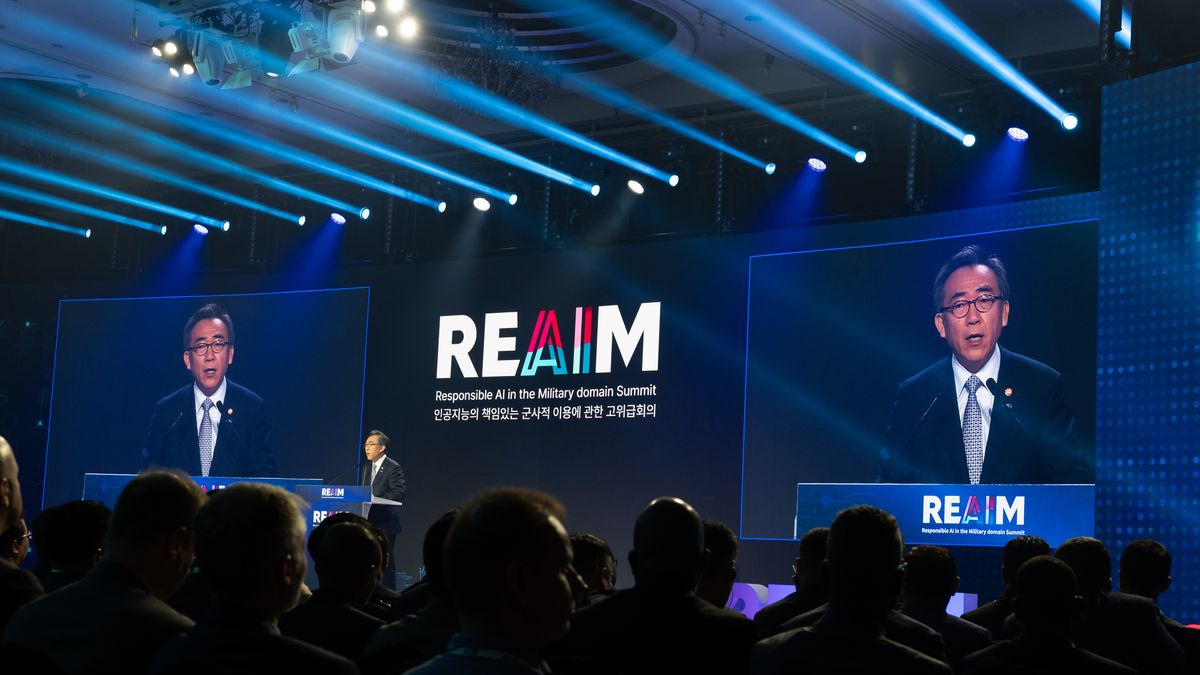Between Monday and Tuesday of this week, a meeting was held in Seoul, South Korea, an event on domain responsibility Artificial intelligence (AI) in the military (REAIM), in which an Argentine delegation participated. It is a “comprehensive and inclusive” platform, as defined by the South Korean government, where officials from the Ministry of Foreign Affairs and the Ministry of Defense presented the advances in AI applied to the national security defense system and the limitations – practical and ethical – that the phenomenon entails.
Representatives from Holland, Kenya, the United Kingdom, Australia and the Netherlands also gave presentations, as they were part of the 96 delegations present. Argentina was represented in this context by Raúl Guillermo Marino, Secretary of Research, Industrial Policy and Production for Defense of the ministry currently headed by Luis Petri.
In an interview with ScopeThe official said that Argentina “is in the exploratory and development phase” regarding the Ministry of Defense’s activity with AI, although a latent challenge is “the training of specialized human resources.”
In turn, he assures that South Korea “recognizes the activities” that Argentina carries out in this regard, whose economic impact is “multivariate.” Currently, the governance of the weapons system, strengthening the security system and anticipating possible cyber attacks are key issues for management.
Journalist: What advances regarding the application of AI in the Argentine army can be found in the national defense system?
Raul Marino: Argentina is in an exploratory and development phase in terms of the activities of the Ministry of Defense. This is being translated into small, concrete actions, for example in the governance of the weapons system, the integration of different fire agencies that are using these AI tools for daily activities. Another example could be what has to do with image identification, cyber defense and cyber security. These are some of the issues for which AI is being developed within the field of defense.
Q: What are the challenges or obstacles that Argentina faces in continuing to advance in this regard?
RM: Firstly, the training of human resources in the specific field of AI. Today, many of the activities in the field of research within the Ministry are carried out by professionals who have specialised in new AI technologies. Being able to form solid technical teams that allow us to move on to the following applications is the transition we are in.
Q: Is Argentina working with other countries to develop various projects related to AI in the field of Defense?
RM: We do not have any formal collaboration with any country, but Argentina is open to all possibilities of integration within the framework of regional or global development that allow these developments of certain applications.
Q: What is the objective of Argentina’s presence at this type of event? What are the expectations?
RM: There are formal aspects in which Argentina’s presence responds to the intention of participating in these types of events. On the other hand, there is the recognition of a country like South Korea towards ours, in which the invitation is formalized. This is a recognition of the activities that are being carried out in Argentina. In addition, with all the leading AI representatives from other countries present, it is not only enriching to know who is behind the development but also to establish connections for possible concrete actions.
Q: What kind of projects or specific actions are planned for the future?
RM: There are a multitude of projects. Everything that has to do with strengthening the cybersecurity system and anticipating possible threats in the national defense system is something that generates a lot of interest for us. From a more military perspective, there are applications that have to do with the specific use of certain technologies in the FFAA weapons system, where we are getting involved with a certain systematicity. At the same time, the Ministry has a connection in scientific-technological terms with bodies such as the Geographic Institute, the Hydrographic Institute, and the Meteorological Institute, where there is a lot of scientific-technological development with the application of AI to anticipate forecasts and catastrophe situations. That same information, which makes up a public service, is what is processed for military operations, so there is a conjunction between defense and the entire community.
Q: What is the economic impact of developing AI applied to the defense system?
RM: It is multivariate. First, there is an impact in being able to use AI tools that allow us to avoid repetitive and systematic tasks, and use people for more complex tasks, which produces savings in terms of process simplification and resource optimization. The other is a consequence derived from the application of AI and has to do with management. We need human resources, technology, and a work team. This allows us to spill over into the development of regional economies because it allows the installation of new industries and opportunities.
Q: Is the national defense system model based on or referenced by that of another country?
RM: In terms of AI, which is what concerns us, it is a difficult combination from which one can align oneself with a model. AI itself is in a state of deregulation as a result of innovation and technological advances that make it difficult to pigeonhole into something. AI is neither good nor bad, it depends on how it is used.
Q: How then can we draw ethical boundaries regarding the use of AI under the pretext of protecting the country?
RM: Major countries and economic communities have realized that trying to regulate AI is very difficult. By its nature, it is about innovation itself. That is why I believe that these events have the added value of generating major consensus, major agreements to define what use we are going to give to AI specifically in the field of defense, which can have implications for human lives as well as the environment.
Source: Ambito




